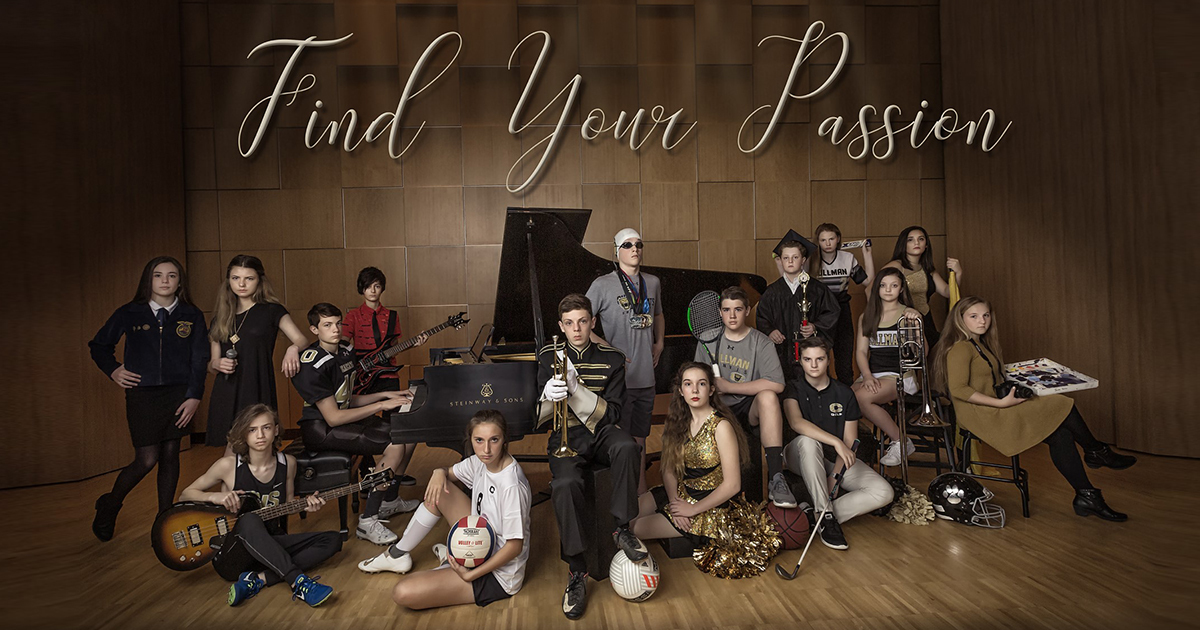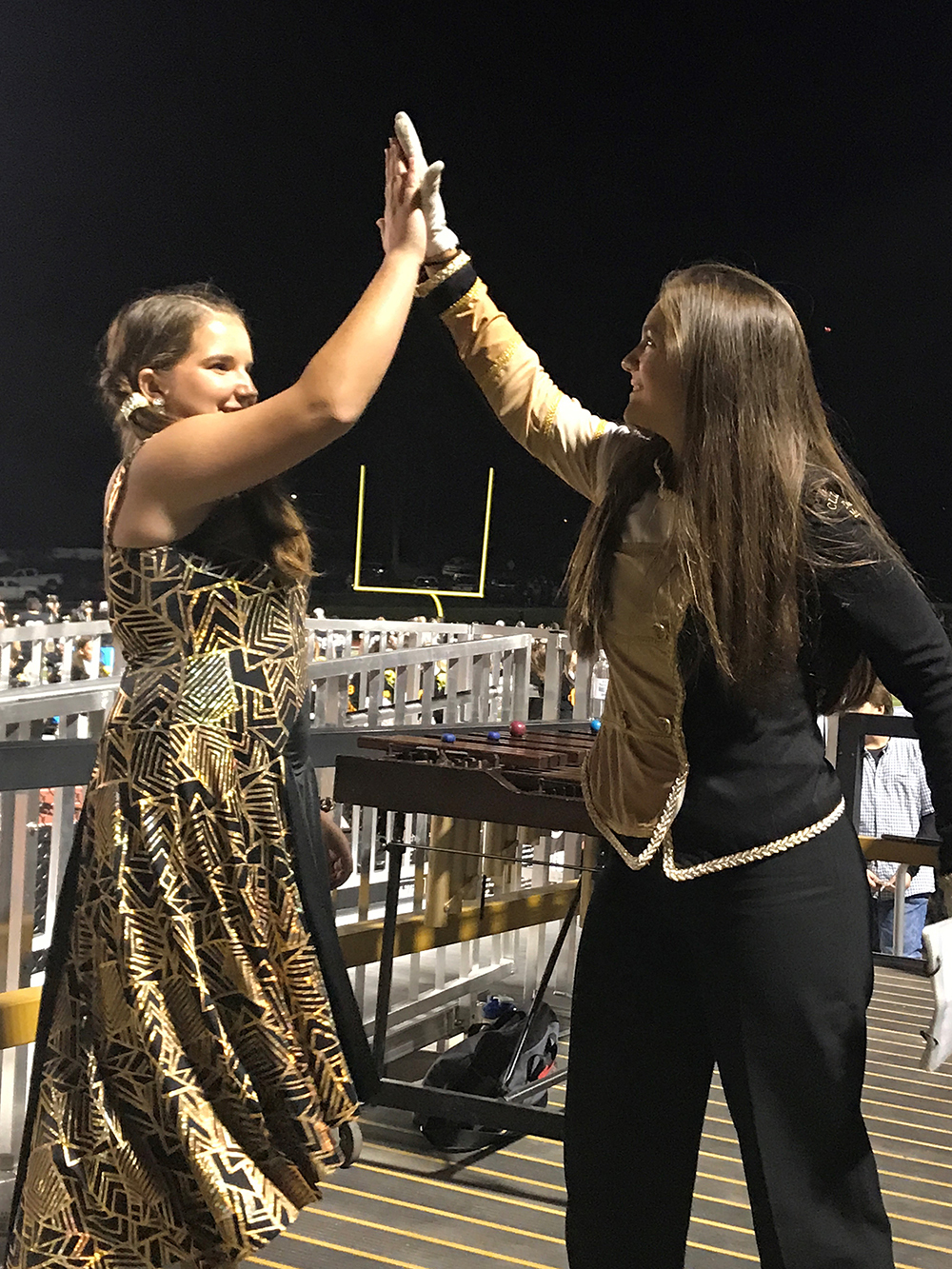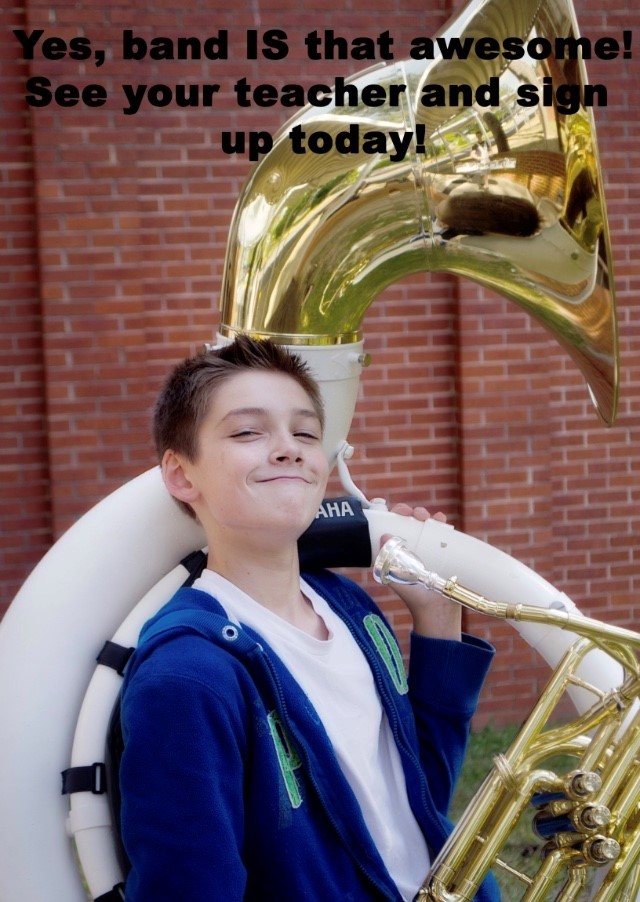My Experiences as a 30-Year Band Director
An Interview with Linda Bean
Date Posted: July 03, 2019

Linda Bean and students from Cullman Middle School
Where and what grade levels do you teach and how long have you been a band director for?
I teach 6th, 7th and 8th grade band at Cullman Middle School in Cullman Alabama. This upcoming year will begin my 30th year and all of them have been at Cullman Middle School.
What is your teaching philosophy when approaching beginner clarinet and saxophone? Do you have any phrases that you tell your beginner clarinet and saxophone students?
My philosophy is to have the kids produce a tone and a basic melody as soon as possible and to help them have fun while they are playing. If students are having fun they are going to keep trying and practicing and getting better. On the clarinet, we encourage students to play out with a strong tone using lots of air and help them get an initial sound and learn their basic fingerings along with correct embouchure formation. For the saxophone, we help students understand their instrument naturally plays loud and encourage them to maintain control over the sound through mastery of the air flow and embouchure.

What are some method books you would recommend for beginners?
The book we use for beginning band is Essential Elements. This book provides a strong foundation from which the director can pull in various supplements to keep students motivated and emphasise techniques necessary for improvement. In addition to Essential Elements the number one tool I would recommend is SmartMusic. With SmartMusic you have access to over 40 of the best method books for all instruments and thousands of solos and band arrangements. We have been using it for many years. When SmartMusic first came out they only had one method book in their library and I believe it was Essential Elements for violin. I remember calling and asking if they would include Essential Elements for beginning band which they did the following year! Currently SmartMusic has over 40 method books available, including jazz books. In addition, SmartMusic has a terrific tool for sight reading and we use that a great deal.

What are your thoughts on JUNO Reeds?
I love the JUNO reeds! They have filled a need we have had for quite some time for young players. JUNO reeds provide a consistent quality at an affordable price. With young players, it is important to have a reed that is not chipped that students can trust will perform for them. The reed also has to be affordable or they won't replace it. Young players have a tendency to chip their reeds often in the beginning until they gain more experience putting them on and learn to maneuver without damaging them. Our school system has a 30% poverty rate, so we have to take into consideration the financial situation of our students. We have found JUNO reeds to be a great asset for our band program.
"...don't get tired of informing each new person of what you do and the importance of music for the students." - Linda Bean
What is the greatest challenge you’ve faced as a band director and how have you overcome it?
Over a 30-year period of teaching you can imagine the number of leadership transitions I've had to go through with administration as well as coworkers. I'd say don't get tired of informing each new person of what you do and the importance of music for the students. Each time you get a new administrator and/or coworker you have to be a cheerleader for your program. Never give up when you go through tough times and are dealing with people that don't understand or appreciate what you do. During these times maintain an open line of communication while keeping your focus on what is best for the student. It is important to keep all stakeholders within the school system and community informed about the band program. A calendar of events as well as establishing yearly community events such as a Fall Band Exhibition and a Spring Concert are great places to start. As important as it is to be a cheerleader for your own program it is just as important to maintain and demonstrate great respect for all the programs on campus.

What is one skill you wish you had going into your band director career?
Going into my career I would have benefited from more knowledge of instrument repair. No one ever teaches you that and then all of a sudden, you have clarinet and flute players with adjustment problems along with a plethora of other repair issues. Over the years I learned by watching and asking questions of the instrument repair person that visits our school. I also learned from reading and going to various clinics. I believe it is important to admit when you don’t know how to do something and don’t be afraid to ask questions. Today it may also be as simple as doing some research via the internet and/or searching out applicable webinars.
Looking back 30 years ago I would have also liked to have had the understanding of all the instruments to include their fingerings and intricacies that I have now. I try to play along with the classes on different instruments all the time and that is what has helped me gain a more instantaneous knowledge of the instruments and their fingerings. That is the kind of knowledge that comes with time and the payoff is highly effective and enjoyable teaching.
"I believe it is important to admit when you don’t know how to do something and don’t be afraid to ask questions." - Linda Bean
What are some tips that you could share for retaining your students in band?
In regard to retention, building relationships between younger and older students is what has been the most successful for us through the establishment of a mentor program. We invite select, highly established students to come in for rehearsals with the younger groups. It can be something as simple as sitting in and modeling the correct posture and hand position or checking reeds and saying “oh, it might be time to change your reed”. Seeing the older students having fun and getting to know them helps build a bridge that makes the younger students want to keep going. We try to always keep the fun in music and approach it as a lifelong skill. Activities like visiting college band performances and hosting our local community band provide our students with a snapshot of how it is possible for music to play a role throughout their lives beyond middle and high school.

What are some recruitment tips you could share?
We have had success taking our marching and/or jazz band to the feeder elementary schools to perform. We talk to potential students and make them aware of the opportunities available to them in band. It is helpful to let potential students see the instruments up close and even hold them (with guidance of course). Also, look for ways to make band affordable for students whose parents may be facing financial challenges. Embrace your athletes and encourage an atmosphere that welcomes both athletics and band. Information is a vital part of successful recruitment. They say a picture is worth a thousand words. Thus, a well planned campaign of recruiting posters around the school as well as approved photos shared on various social media platforms provide opportunities to educate parents, students, coworkers and the community about the band program and all the benefits it has to offer.
We took this a step further and created a recruiting video. The video provides a sneak peek into our performing groups from beginning band to high school. It includes a section featuring past scholarship recipients which assists in building academic awareness among all stakeholders.

Finally, what makes you proud about your band program?
I’m most proud of the tradition of giving back to the program through teaching that has been established through our mentor program. This culture of respect for the less experienced player takes time to build and nurture and requires teamwork and cooperation where multiple band directors are involved. Our middle school students mentor the beginner band and our high school band students mentor the middle school bands. We go a step further and invite alumni who are college students and/or professionals as well as educators in the music field to serve as instructors and clinicians. For example, one of our graduates who has written music for television and film came to talk to the students about composition and the recording aspects involved. Another former student who plays professionally all over the world gave a clinic and discussed various aspects of what it takes to become a professional musician. We have also utilized Skype as a vehicle to connect students with our graduates in the music field for various private lessons and instructional clinics. These are ways for our older students to stay connected to the band program and give back to the younger students, building it for the future.
Subscribe to the We Are Vandoren E-newsletter (WAVE) to receive 4 weekly articles for Performers, Students, and Educators